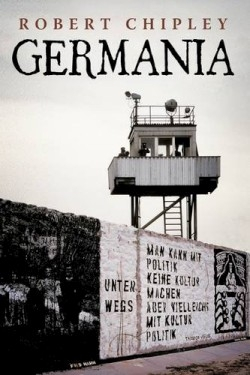Germania
Germania plunges readers into a plot that exemplifies the struggles of people who have had to survive extreme political regimes and cope with the tension between politics, survival, and their personal moral compasses. Hans Klug, a former East German border guard, is blackmailed for his role in the death of a man who attempted to escape through the Berlin Wall. While working through this threat, he must confront Germany’s complex history, his own behavior and secrets, and the roles of his family members.
Robert Chipley offers a tortuous plot that educates readers in recent German history. During the mid-twentieth century, Germans lived through the demands of ultra-political structures and were forced to acknowledge genocide, stolen treasure, spying, cover-ups, and deep distrust. Germania‘s strong plot reveals the author’s deep knowledge of his subject as well as his ability to convey the tensions and subtleties of the society he clearly understands.
Hans is clearly more oriented to the communist perspective than the fascist one. Other characters are present to help him solve his problems, providing money, instructions, and introductions to people in Germany and in the US, where he travels during the middle of the novel. While he seeks help from some characters, he uses others, making him a character with both positive and questionable traits.
Hans has a love interest, but as her appearances are few in number, her presence seems like something of an afterthought.
Chipley distinguishes between the English spoken by East German characters and Americans. The East German dialogue is stilted. Unfortunately, as Klug doesn’t travel to the US until well into the book, readers may assume that this stilted style is standard, rather than Chipley’s way of distinguishing between the two sets of characters. Additionally, the Americans’ speech still betrays an occasionally unnatural turn of phrase. For example, “it is” is used when a contraction might be more appropriate.
“Germania” is an ancient term, first adopted by Julius Caesar, that referred to the geographical area of land on the east bank of the Rhine River. In the novel, Chipley describes this as the name given to the capital of the world Hitler envisioned. Thus, the title carries the book through its historical roots to the present time.
In spite of some weaknesses in characterization and dialogue, the story will entertain and provide a greater understanding of the challenges that Germans faced during a major portion of the twentieth century.
Disclosure: This article is not an endorsement, but a review. The publisher of this book provided free copies of the book and paid a small fee to have their book reviewed by a professional reviewer. Foreword Reviews and Clarion Reviews make no guarantee that the publisher will receive a positive review. Foreword Magazine, Inc. is disclosing this in accordance with the Federal Trade Commission’s 16 CFR, Part 255.

